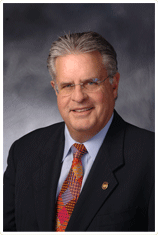This week in the Missouri Senate, we approved a comprehensive tax relief measure that will benefit all businesses and individuals in the state. Senate Bill 26 changes the income tax rate for individuals and corporations and creates a new business income deduction.
Under the legislation, the personal income tax rate, starting in the 2014 tax year, is lowered by 0.75 percent over a five year period, maxing out at 5.25 percent in 2018. The bill also reduces the corporate income tax rate by 0.75 percent over the same period, lowering it to 5.5 percent by 2018. In addition, the legislation creates an individual business income tax deduction starting at 5 percent in 2013; once fully phased-in, taxpayers can deduct 50 percent of their business income for all tax years after 2016.
Senate Bill 26 also creates a way for Missouri to begin collecting sales taxes for online purchases. Legally, people who buy products online are already required to voluntarily pay what is known as a use tax on their purchases. Unfortunately, few do. This bill allows Missouri to collect those taxes, which will bring in additional revenue to the state and level the playing field for local businesses.
By lowering the income tax rate and providing a business income tax deduction, we can give businesses and individuals the opportunity to reinvest their hard-earned dollars back into our economy. It reaffirms our commitment to making Missouri a business-friendly state where companies can grow and expand.
The measure also keeps us competitive with neighboring states in attracting new businesses. Senate Bill 26 takes a measured approach at tax relief, balancing the benefits of a tax cut with our budgetary needs. This bill is one of the most important economic development measures we’ve considered in years. I’m hopeful we can get it to the governor’s desk.
We also gave approval this week to Senate Bill 129, also known as the Volunteer Health Services Act, which will allow licensed healthcare professionals to provide volunteer services for an organization.
Most doctors are forced to take out a separate medical liability insurance policy for working in a free clinic, which can cost thousands of dollars a year. These are physicians who are working without compensation, donating valuable time to care for those unable to afford medical services. It’s not fair for them to carry such a large financial burden for simply volunteering their time and skills.
Under Senate Bill 129, physicians who volunteer at free clinics will not be held liable for any civil damages unless they acted with a conscious disregard for the safety of others. The bill also limits doctors to performing acts within the scope of their license and practice and requires physicians to comply with all applicable health care regulations. The measure now goes to the House for consideration.
In addition, the Senate approved the following measures this week:
- Senate Bill 73, which prohibits law enforcement from setting up roadside checkpoints based on motorcycles;
- Senate Bill 90, which allows city council members in third class cities to serve four-year terms, contingent upon approval from local voters;
- Senate Bill 102 and Senate Bill 157, which adds several types of scrap metal to those requiring documentation by scrap dealers;
- Senate Bill 114, which allows amateur-brewers to drink their beer outside of their home as long as its only for personal use, among other provisions;
- Senate Bill 127, which authorizes a statewide dental delivery system under MO HealthNet;
- Senate Bill 164, which protects workers and job applicants from having to divulge username and password information for personal online accounts to employers;
- Senate Bill 208, which raises the age limit for when a youth may reenter the foster care from 18 to 21 years old; and
- Senate Bill 236, which requires the Missouri Highway Patrol to seek approval through the appropriations process before making any purchases above $100,000.
|



